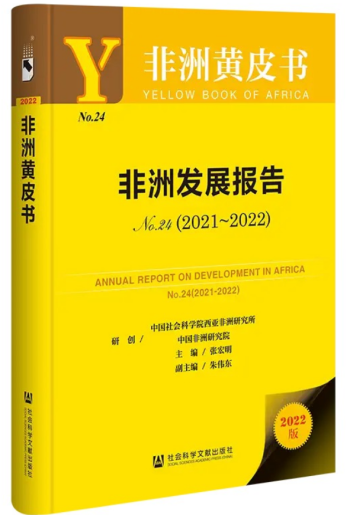ANNUAL REPORT ON DEVELOPMENT IN AFRICA No.24 (2021-2022)
ANNUAL REPORT ON DEVELOPMENT IN AFRICA No. 24 (2021-2022)

Abstract
In 2021, the profound impact of the century-old changes and the epidemic on Africa's politics, economy, society, security and diplomacy will be further manifested, and the situation in Africa will be complicated and profoundly changed. Although the political and security situation in Africa can still be summarized as “general stability and local instability”, its connotation has changed. In the past year, the economic crisis caused by the new crown epidemic has continued to ferment in Africa, which has been transmitted to many levels of and has been intertwined with inherent ethnic society, politics, security, etc., and religious conflicts and various social problems to cause multiple crises. Many African countries have experienced turbulent situations rarely seen after political transformation, which are prominently reflected in the resurgence of military coups, frequent social riots, escalation of internal conflicts, rampant terrorist activities, rampant piracy, etc. Even regional powers have not been spared. What is particularly worrying is that the military has no intention of “returning power to the people” after taking power, and the turmoil of regional powers also has the risk of spilling over to neighboring countries. Fortunately, although the political and security risks or challenges faced by Africa have increased significantly, the overall stability and development trend of Africa has not reversed.
After experiencing a severe recession, the African economy will achieve a positive growth of 4.7% in 2021, mainly due to factors such as global economic recovery, rising commodity prices and the gradual recovery of international logistics. Although the African economy has gradually recovered, the pace of recovery is significantly slower than the average level of the world and developing economies. From the trend point of view, there are both pros and cons affecting the economic trend of Africa. The favorable factors are that the fundamentals of Africa's superior resource endowment, huge demographic dividend, accelerated urbanization process and emerging manufacturing industry have not changed. The downside is that the impact of COVID-19 on economic activity in Africa cannot be underestimated due to poor medical conditions, fragile epidemic prevention systems, and low vaccination rates. On the other hand, due to the constraints of: single economic structure and an export-oriented economic model, coupled with the slowdown in global economic recovery, rising inflationary pressures, increased food insecurity, and tightening of the international financing environment due to the conflict between Russia and Ukraine, the African economic recovery process may be under pressure again, its uncertainty is also increasing.
Against the backdrop of the COVID-19 pandemic and the superposition of major power competition factors Africa's international situation has shown complex changes: on the one hand, Africa's status in the world economic structure has been further marginalized, and on the other hand, Africa importance in the international political landscape has increased promote. Over the past year, major powers in the world have strengthened their relations with Africa through high-level visits, summits, and policy documents. In general, great power competition has more advantages than disadvantages for Africa's international situation. Although Africa's structurally dependent position in international relations is difficult to change in the short term, as Africa becomes a target for major powers to compete for, there are options and strategies for Africa's diplomacy. Space is also increasing. Faced with opportunities and challenges, most African countries refuse to take sides in the great power competition in order to maximize their own interests. In order to cope with internal and external challenges and enhance their capacity to bear pressure, African countries have accelerated the process of economic integration by launching the “African Continental Free Trade Area” while relying on the African Union to actively coordinate their positions on major international issues, trying to speak with one voice to increase the overall influence.
2021 is an important year for China-Africa friendly exchanges and practical of Africa cooperation. China and Africa have joined hands to fight the epidemic and promoted cooperation in various fields to achieve fruitful results. It is highlighted in the fact that China-Africa trade volume reached a record high of US $ 254.3 billion. China has been Africa's largest trading partner for 13 consecutive years; 52 African countries and The African Union Commission and China signed the “Belt and Road” cooperation document, basically realizing the “ full coverage” of the “Belt and Road” in Africa. 2021 is also the “ Forum Year for China-Africa cooperation China and Africa successfully held the 8th Ministerial Conference of the Forum on China-Africa Cooperation in Dakar, the capital of Senegal. President Xi Jinping expounded on the “four proposals”on building a China-Africa community with a shared future in the new era, and announced the “nine programs” for practical cooperation with Africa, push the China-Africa comprehensive strategic cooperative partnership to a new height. However, affected by factors such as the new crown epidemic, competition between major powers, conflict between Russia and Ukraine, and the downturn in the world economy, the development of China-Africa relations is also facing an increasingly complex international environment.
Keywords: African; Economic Recovery; Diplomatic Independence; Foreign Relation; China-Africa Relations


